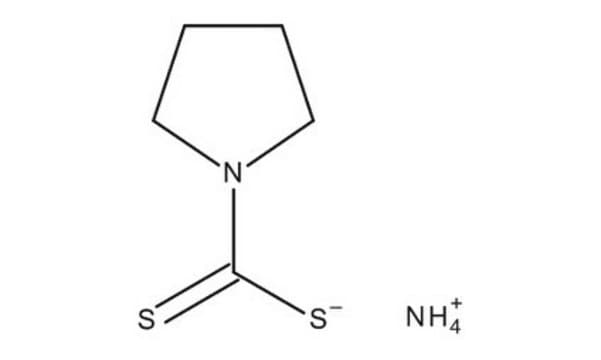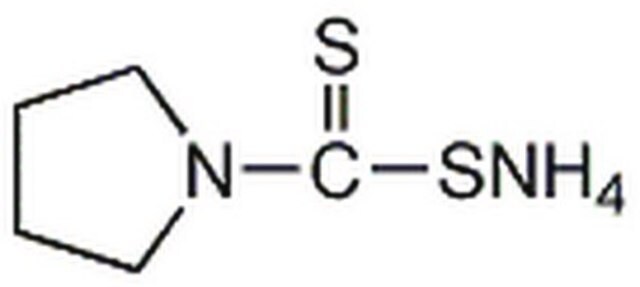P8765
Ammonium pyrrolidinedithiocarbamate
~99%
Synonym(s):
1-Pyrrolidinecarbodithioic acid ammonium salt, APDC, Ammonium pyrrolidinecarbodithioate, PDC, PDTC
About This Item
Recommended Products
biological source
microbial
Assay
~99%
form
(powderor powder with lumps)
mp
153-155 °C (lit.)
solubility
water: 50 mg/mL, clear to very slightly hazy, colorless to faintly yellow
storage temp.
2-8°C
SMILES string
N.SC(=S)N1CCCC1
InChI
1S/C5H9NS2.H3N/c7-5(8)6-3-1-2-4-6;/h1-4H2,(H,7,8);1H3
InChI key
MDDIUTVUBYEEEM-UHFFFAOYSA-N
Gene Information
human ... NOS1(4842) , NOS2(4843) , NOS2B(201288) , NOS2C(645740) , NOS3(4846) , RELA(5970)
Looking for similar products? Visit Product Comparison Guide
General description
Application
- to inhibit nuclear factor κB (NF-κB) mobilization and TNF (tumor necrosis factor) production in human monocytes
- to reduce neutrophil activity in rats
- to prevent Ca2+ influx in adriamycin (ADR)-treated podocytes
to abrogate the microRNA-146a promoter luciferase reporter activity in human brain cells
Biochem/physiol Actions
Storage Class Code
11 - Combustible Solids
WGK
WGK 3
Flash Point(F)
Not applicable
Flash Point(C)
Not applicable
Personal Protective Equipment
Certificates of Analysis (COA)
Search for Certificates of Analysis (COA) by entering the products Lot/Batch Number. Lot and Batch Numbers can be found on a product’s label following the words ‘Lot’ or ‘Batch’.
Already Own This Product?
Find documentation for the products that you have recently purchased in the Document Library.
Customers Also Viewed
Our team of scientists has experience in all areas of research including Life Science, Material Science, Chemical Synthesis, Chromatography, Analytical and many others.
Contact Technical Service










